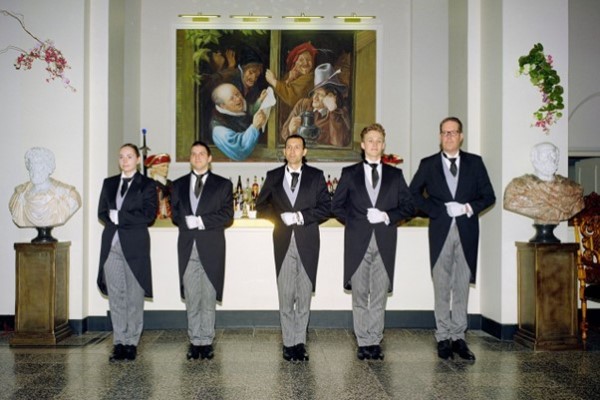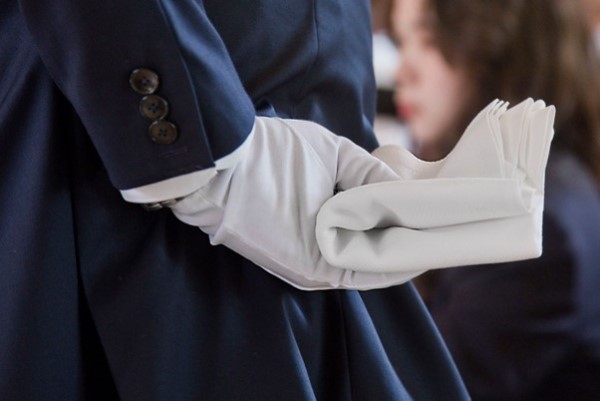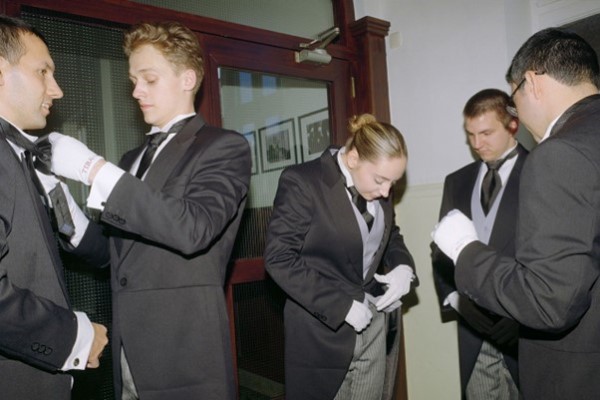"Downton Abbey” but with NDAs: how to be a butler to the super-rich


This article was originally published on 13 September, 2024 in 1843 magazine.
In the frescoed ballroom of the International Butler Academy (TIBA) in the Netherlands, a gaggle of students shuffled into line. “You may have walked in a certain way for 25 years, but this is not how you do it as a butler,” said their etiquette instructor, addressed by everyone as Mr Munro. He ordered them to slot their arms behind wooden crosses, which they held against their spines – “torture devices” to correct posture. “Now relax!”
The suited students – five men and two women, aged from mid-20s to late-50s – primly waddled across the marble floor. Their crosses were removed and each was handed a book and a silver tray loaded with wine glasses. “This is harder for those that are follically challenged,” said Munro (who is bald). “But if the book is in the right position, I can do almost anything.” He performed a pirouette with a copy of Forum Kritische Psychologie, a German psychology journal, perched on his head. As his students tried to emulate him, the sounds of books slapping the floor and wine glasses smashing echoed around the hall.
As soon as they found their balance, Munro started hurling balls the size of grapefruit at them. The students swerved, with varying degrees of success. The aim of the exercise was not only to protect the glassware but maintain a calm demeanour under bombardment; although butlers are never centre stage, they are, ultimately, performers. “We are working for real people, but it’s still a show,” Munro, a former actor, told me. This was something that his students recognised as well. As one academy graduate put it to me later, “We’re only actors. It’s a role we play.”
Munro’s students were over halfway into a ten-week course at the academy, considered by many in the business to be the most intensive butler-training programme in the world. Students live in a 135-room former monastery and role-play at buttling full time. At a cost of €15,500 ($16,600), the diploma is an expression of commitment, both to a career as a butler and the archaic philosophy of service embodied by the school. Several students told me that the most important skill they gained was an instinct for “pre-emptive service”: knowing in advance what their principal, or employer, may want or require.
The precise theatrics of the job bolster the notion that a butler is someone who can handle anything with poise and elegance
That butlers still exist at all is somewhat surprising. The job, which is most associated with the Victorian and Edwardian eras, involves a skillset that seems at odds with the needs and tastes of modern rich households. A traditional English butler would prepare the dining room and serve at least three meals a day; he was responsible for the household china, table linen, wine cellar and managing the junior staff. He may also have acted as his principal’s valet, or personal dresser. (Befitting his status, the butler was, unlike other staff, permitted to use the front door.)
TIBA, which trains 30 to 50 new butlers a year, is a star institution among a small constellation of schools and recruiters that prepares people for this particular form of service. The booming economies of Saudi Arabia and the United Arab Emirates are a source of great demand, according to staffing agencies; there, the mores of the European aristocracy are highly valued (British and German butlers can command annual salaries of $100,000-200,000). China, too, is home to a growing population of super-rich individuals, who seek high-end staff to match their luxury accommodations. Traditional butlers, schooled in the etiquette of the upper classes, can also help those newly arrived in Europe or America ingratiate themselves to an unfamiliar culture by acting as discreet guardians of good taste. The precise theatrics of the job – which include wearing white gloves, being able to fold napkins in an array of flamboyant shapes and penning eloquent, last-minute birthday cards on behalf of their principal – bolster the notion that a butler is someone who can handle anything with poise and elegance.
In truth, many clients seem more attracted to this idealised vision of the butler than the skills customarily associated with it. Rich households, particularly in Western countries, now tend to have fewer staff, in part because they prefer to retain a close-knit circle of employees. As a result, the butler’s job description has broadened. Some clients have come to treat their butlers as a nanny-cum-chef-cum-chauffeur, rather than as a sommelier with a knack for buffing silver.

The enduring appeal of having a butler is partly due to the cultural legacy of Jeeves (who is in fact a valet) from P.G. Wodehouse’s novels. Jeeves’s commitment to his principal, Bertie Wooster – which manifests in everything from warding off Wooster’s hangovers with an egg-based concoction to drugging his enemies – is central to his allure. In “Very Good Jeeves”, Wooster conveys his gratitude: “‘Jeeves,’ I said – and I am not ashamed to confess that there was a spot of chokiness in the voice – ‘there is none like you, none.’”
It is not hard to understand why the nouveau riche would want to cement their status with the trappings of manor houses of yore – or why the rich in general would want an even-tempered, well-trained member of staff to attend to their every desire. But I wondered why people still aspire to become butlers. Bryan Boyle, a sociologist at Vrije University in Brussels who is conducting an ethnography of the profession, has studied the paradoxes behind the motivations for pursuing such a career. Butlers, he told me, are “the perfect social intermediary between rich and poor” – required to behave with absolute altruism while working at the apogee of the class hierarchy. When considering that butlers are required to be simultaneously visible and invisible – Jeeves, for example, is known to apparate into the room – one begins to regard them as almost ethereal beings, flitting between two worlds.
Compared with other positions someone might pursue among the super-rich, such as “house manager”, personal assistant or yacht crew member, becoming a butler requires esoteric knowledge and ritualised behaviour. It requires someone to buy into the same fantasy as their employers – that their job is a calling, the pinnacle of service – even as it carries the financial and personal risks that come from entering an unregulated profession in which your career depends on the whims of a powerful individual. As one recruiter told me, butlers need “almost a demeaning attitude”.
Among the students parading in Munro’s class was a 30-year-old British man named Mr Bennett (like many of the students, who are conscious of the discretion expected by the super-rich, he requested his name be changed). Bennett, who has a slight physique and delicate features, is well-groomed and exceedingly polite. Earlier that day, Robert Wennekes, TIBA’s mercurial founder and CEO, had told an anecdote about a rich old man with a young attractive wife, who had requested an ugly butler. Wennekes said that if that were to happen again, he would ask if Bennett were available. “Very good sir,” Bennett responded.
Bennett seems used to being joshed by superiors. He went to boarding school, studied theology and almost became a priest before joining the Metropolitan Police instead. “I’m quite institutionalised,” he admitted, “but maybe I just have a fetish for uniform.” Becoming a butler represented a way to block out the “grim life” he’d experienced as a policeman. To be surrounded by wealth, and to feel objectified by it, seemed like “the only way to stay sane in a world that can sweep you up,” he told me. “I’m a disposable asset and knowing that keeps me grounded.” Bennett gained some experience at Buckingham Palace as a part-time footman (a lower-ranking role) before quitting the force. “I like living in a different era,” he said.
Bennett appeared to be in the right place. The academy’s curriculum contains nods towards contemporary living – such as a class on how to troubleshoot the grandiloquently named luxury home-automation system De Opera Domotica – but remains firmly rooted in tradition. Every few days, two students are appointed head butler and assistant head butler, and “masterships” – responsibilities for everything from laundry to catering – are divided up between the rest. The students must lay the dining table three times a day with the cutlery and plates set precisely the same distance apart each time, and serve meals in synchronised fashion. This “Downton Abbey” roleplay is accompanied by lessons covering the practicalities of a life in service – stocktaking of the pantry, larders, uniforms and equipment; budgeting for a home and its staff; cleaning; and valet skills, such as how to pack a suitcase, pair a tie and shirt, and polish shoes. Bennett had already developed his own tips and tricks: “I always carry a crumbing tool for the table” (a curved piece of metal designed for scraping a tablecloth) and a caviar spoon made from mother-of-pearl, rather than silver (one doesn’t want a metallic taste “to ruin the flavour of something that costs £10,000 [$12,700] for 500g”, he explained).

The development of such instincts takes time – and a degree of emotional intelligence that some think can’t be taught. During the course the students complete psychology exercises using numbers, shapes and colours to distinguish what sort of person they are. “I was a square,” said Bennett with a knowing smile. “I generally try to get on with people, and am very detail-oriented.”
This spirit of perfectionism is reinforced by the school’s grading system. At the start of the course the butlers all have a score of 1,000. Each time they slip up, they lose a point. On average students end up somewhere in the 700 region; 800 equates to a merit, 900 a distinction. The highest ever score was 977, received by a woman named Karen Xiao in 2016. When Wennekes saw her results he was astounded: “I hired her!” (Xiao now heads up the academy’s international training programme, in which she teaches students about Asian etiquette and customs. She was previously based in Chengdu, where the academy has a sister school focused on China’s lucrative hospitality and real-estate market.)
The pressure to perform is also aggressively applied by Wennekes. There are whispers that he deliberately adjusts his routes around the house to keep students on edge. “There are no exits and everywhere [there] is him,” said Bennett, who recounted being called an “F-ing C-word” by him during one training session. “Do I respond well to it? Yes. The flipside is that it does allow Mr Wennekes to indulge the worst excesses of his personality as a principal.”
Wennekes admitted to me that he was “playing a character”, though that did not make him any less terrifying. One morning, he led a workshop on job applications and interview preparation. He marched up and down the classroom like an army drill sergeant, puffing on his vape with a book balanced on his head, pausing intermittently to tap at his PowerPoint presentation like it was a map of targets due to be bombed.
The workshop was a heady cocktail of tips, trivia and threats. “If I hear you’ve dressed inappropriately, or show up late for an interview, then you’ll lose your diploma!” He tore into the students’ CVs: “What’s this photo! You look ridiculous!” We practised handshakes: “Too hard! Too soft!” We also did a little roleplay: “The Mrs is away, I’d like you to hire me a couple of hookers,” he barked at one student. He warned of even riskier requests, such as couriering baggage around the world without knowing what’s inside. “You gotta be careful. We’re in a very strange job,” he muttered. “Now, how many golf balls can you fit in a Bentley?”
We broke for lunch. Wennekes, who sat on a wooden throne at the head of the table beneath eight crystal chandeliers, told a story about the time he discovered that a pair of graduates had slipped out of the academy to go drinking, which is prohibited. “It was two students, out of 14, but I took the diplomas away from all of them,” he said. “Two of the boys, their parents were attorneys…they were sending me letter after letter threatening me. I just laughed. I said: ‘F***ing sue me!’”
Wennekes is a harsh taskmaster, but so are some of the characters his protégés will go on to serve. Mohammed, an academy graduate who has over a decade’s experience and works for a Saudi royal, said that Wennekes “really showed us how the job is going to be”. Being sworn at or telephoned at 4am with a demand for snacks is par for the course for Mohammed and his fellow graduates, as is cleaning up the aftermath of a night of drink, drugs and escorts. When your intoxicated boss goes to bed at 6am following a party, and you have to wake him at 8am for a meeting, it’s like “playing the lottery”, Mohammed said.
One agent told me of a client who requested an elephant be brought into a ski resort for their daughter’s birthday (it didn’t happen); another wanted a favourite yogurt from Russia flown to a yacht (it did). Mohammed has secured a box for the Champions League final three hours before kick-off and booked the last table for the closing night at El Bulli, a much-hyped restaurant in Spain. The lady of the house once wanted a pair of unlabelled shoes she saw in a photograph; Mohammed tracked them down to a boutique in Hawaii and had a pair delivered to Dubai on a first-class aeroplane seat.

If butlers feel the demands placed on them are too onerous, it can be hard to push back. The industry, one recruiter told me, is “controlled by clients”. The contracts can be vague or non-existent, and future job prospects depend on a good reference, which dissuades people from resigning abruptly. The butler’s trial period offers a crucial opportunity to clarify the job description, particularly as amorphous hybrid roles have become the norm – and to check that their accommodation is not a windowless room in a cellar (which is not unheard of).
The recruitment process itself reflects a power imbalance that few seem willing to challenge. During his workshop, Wennekes told the students that when a prospective client calls he asks whether they prefer a “black butler, white butler, gay or not gay, young or old”. (“I don’t want to waste time,” he said.) These clients can be borderline paranoid. A butler who has worked for British rock stars and dynastic families told me she had once sat through an interview with the head of household concealed behind a screen (“but I knew who he was”). The old rock stars never cared about swearing their staff to secrecy, she said, but nowadays non-disclosure agreements (NDAs) are everywhere. You may not even know who the client is until the final stages of your application.
Numerous agencies told me they took great care to avoid a bad fit between butler and client. Phillipa Smith, from the agency Silver Swan, described her operation as akin to a matchmaking service; some wealthy families have treated their staff so badly that they have been blacklisted. She does, however, accept that even when they are placed with appropriate clients, butlers are in a uniquely vulnerable position. “You could get fired one morning because the wife didn’t like her eggs,” said Smith. “Even if you’ve cooked them the same way for years. And there’s no protection. You can’t sue a billionaire.”
Five months after his graduation from TIBA, I caught up with Bennett. He had taken some time to recuperate in London (and to do up his parents’ bathroom) before going on the butler job market. Soon enough, he was doing two to three interviews a week, mainly with Middle Eastern families based in Britain. His background in the police was appreciated, particularly in light of numerous robberies in Knightsbridge. His Englishness seemed to count for something too.
Weeks later Bennett received an offer. Within two days of accepting it, he was taking care of a family with three children and “gargantuan” wealth. He had been hoping for an opportunity to express his flair as a valet, using his principal as a “canvas” onto whom he could splash Savile Row fabrics, silk ties and bejewelled cufflinks. Instead he found he was less of a butler and more of a personal assistant, managing “a calendar that offers maximum exposure of the family to other wealthy families.” He has accompanied the ladies of the house to appointments with expensive private doctors (secured at the last minute) and has hovered in the background while his principal enjoyed a football match in a private box. Although the role is limited to logistics, he has continued to dress and behave like a traditional butler: “Because I like to be on show; who doesn’t love a little bit of peacocking every now and again?”
When he was working as a policeman, Bennett would stand at the gates “outside Downing Street…watch the London Eye go round and round, and think, ‘there has got to be more to life’.” He is not sure buttling is the answer. During his time in the job he has developed the discomfiting awareness that exceptional wealth does not make life into a “fairy tale” for everyone in its orbit. At the moment he’s on £52,000 a year. If he passes his three-month probation period, he has been told his wages will double. There is no contract.
The articles may contain material provided by third parties derived from sources believed to be accurate at its issue date. While such material is published with necessary permission, the Westpac Group accepts no responsibility for the accuracy or completeness of, nor does it endorse any such third-party material. To the maximum extent permitted by law, we intend by this notice to exclude liability for third-party material. Further, the information provided does not take into account your personal objectives, financial situation or needs and so you should consider its appropriateness, having regard to your personal objectives, financial situation and needs before acting on it.